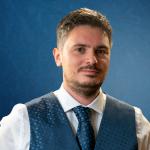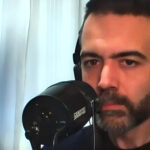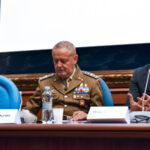Complexity and its enemies
Anyone with a basic familiarity with geopolitics will recognize that it is an extremely complex subject. History, economics, culture, society, politics, geography, psychology and many other areas contribute to its formation and are therefore necessary to understand it. But they are all areas that are themselves incredibly complex, which years of study and reading barely allow us to deal with confidently; very few are those who really master them. The complexity that pervades reality manifests itself in all its evidence in geopolitics.
Complexity, however, is the enemy both of our age and of a phenomenon that age has not, since it belongs to every time and place: propaganda.
Social network: less (knowledge) is more (success)
It is an enemy of our time, complexity, because we live in the age of social networks. The age in which public debate is one, unitary and total: whether we talk about medicine or geopolitics, economics or society, everyone participates in a single, universal debate that shifts nervously from one trending topic to another. In this unitary and universal debate there is no real distinction between expert and non-expert: everyone talks, whether they want to or not, with everyone. And in this the non-expert is favored, because a simple and short message will always have the better, within the masses, on a long and complex one - although the first one is often false and the second one more often close to the truth.
The effect that social networks have had on our public debate and on the individual psyche of all of us cannot be overestimated. By now we are no longer human beings who occasionally pop up on social networks, but we are social users who sporadically act in the real world. When we do so, however, we act according to the ways and methods learned on the Internet: short messages, concise and the more assertive the less we understand about the argument in question. Less (knowledge) is more (success).
Propaganda: simple but wrong
The reduction of public debate to slogans is the ideal environment for propaganda. In it, propagandists swim like fish in water. "Russia is defending itself against an attempt by Ukrainian Nazis, in cahoots with NATO, to attack it treacherously with nuclear and bacteriological weapons.": the short and impactful message with which Russian propaganda describes the ongoing war. "Putin is a mad dictator who invaded Ukraine for no reason"or if he had a reason "is out of fear that Ukrainian democracy will infect Russia as well.". This is what we are told here instead.
To affirm that this last "explanation" of the Russian-Ukrainian war is simplistic and wrong does not mean to affirm that the Russian propaganda is true. It only means that it is false also that of our propaganda. Putin had reasons to invade Ukraine: to affirm this is not the same as saying that these reasons are morally or strategically right, nor is it the same as agreeing with them. Among these reasons, however, there is certainly not that of "democratic contagion", also because Ukraine - with all due respect - is much more similar to the Russian political system than to the pre-pandemic Western one. Ukraine like Russia has a corrupt society dominated by oligarchs. The difference is that in Russia there is now a ruling power that has subordinated the oligarchs, while in Ukraine they remain above the state, with the unintended effect of providing at least a semblance of pluralism and democratic alternation.
Knowledge vs. single thought
Knowing and understanding Russian motivations does not mean, therefore, making them one's own. Certainly it opens to a better awareness of the conflict and therefore of the ways in which it can be resolved diplomatically. But, indeed, such knowledge is useful even for those who hope for an intransigent anti-Russian and anti-Putin line: isn't the first precept of the fighter to know the enemy?
Unfortunately, complexity has been banished from the current "debate" in Italy. When Professor Alessandro Orsini tried to invite us to base our reasoning on complexity, he was greeted not only by hysterical reactions from his interlocutors, but also by a note of censure from his university. Incredibly, this note stated that university professors should limit themselves to presenting "facts and historical evidence", while refraining from "personal opinions". In essence, they should recite by heart the relevant page of "Wikipedia", waiting for a Ministry of Truth to be established that can provide the authentic interpretation of the one party?
In a tragically predictable way, the "officialist" voices immediately resorted to the tired Russian conspiracy theory, whereby anyone who deviates from the official narrative is inevitably a "pro-Putin" or a "Russian troll." You talk about complexity? You are Putin's accomplice, explains Filippo Rossi (a right-wing intellectual significantly considered only on the left). Or more generally, you are an accomplice of any criminal, seems to affirm a journalist who has built a successful career on banality, namely Massimo Gramellini.
To go in-depth is subversive
Do you remember when, a few months ago, "philosopher" became an insult because two authoritative philosophers, Cacciari and Agamben, dared to challenge the Orwellian and illiberal measure of the Green Pass? Today it is the word "complexity" that has become the object of irony and contumely. Only fools and traitors want to investigate and understand the situation: righteous people and good citizens, instead, are ready to "believe, obey and fight", aware that "ignorance is strength".
All this also casts a revealing light on the whole cult of "The Science", the mystique of technocracy and "experts". Experts, specialists and men of science quickly become enemies to be eliminated, if they try to disprove or even problematize the official doctrine. They become exponents of that "culture" to which pseudo-scientist propagandists, emulators of Baldur Von Schirach, react by drawing their guns. Because in reality science is only an instrument of ideology and the expert is revered only to the extent that he supports, as a propagandist, the ideological "truth".
Everything else, it's enemy fifth column stuff.
Founder and President of Centro Studi Machiavelli. Graduated in Historical Sciences (University of Milan) and PhD in Political Studies (Sapienza University), he is professor of "History and doctrine of jihadism" and "Geopolitics of the Middle East" at Cusano University. From 2018 to 2019 he was Special Advisor on Immigration and Terrorism to the Undersecretary of Foreign Affairs Guglielmo Picchi. His latest book (as editor) is Topicality of sovereignism. Between pandemic and war.









Bellissimo articolo… condivido in pieno
[…] Guerra russo-ucraina e fuga dalla complessità […]